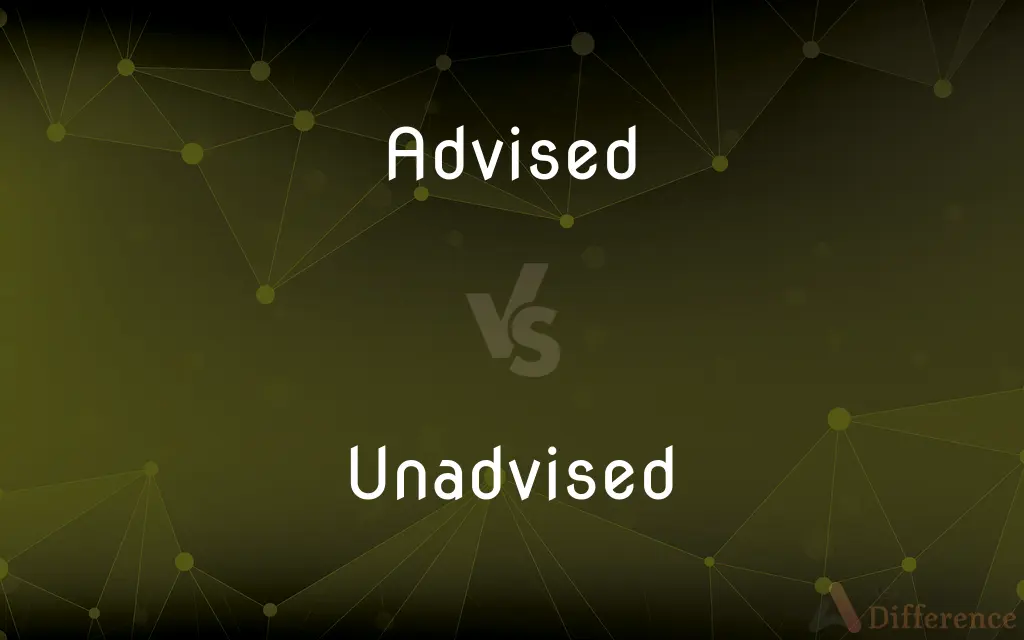Advised vs. Unadvised — What's the Difference?
By Maham Liaqat & Urooj Arif — Updated on April 6, 2024
Advised actions are based on recommendations or guidance, while unadvised actions are taken without consulting advice or considering potential consequences.

Difference Between Advised and Unadvised
Table of Contents
ADVERTISEMENT
Key Differences
Advised refers to actions or decisions made after seeking and considering guidance or recommendations from others, especially from those who are knowledgeable or experienced. This term implies a level of deliberation and prudence, as the advice is typically aimed at achieving a positive outcome or avoiding negative consequences. On the other hand, unadvised describes decisions or actions taken without seeking advice or considering the implications. This lack of consultation can lead to oversight of important factors and potentially negative outcomes.
While advised actions are often associated with careful planning and informed decision-making, unadvised actions can sometimes stem from impulsivity, overconfidence, or a disregard for external input. The distinction is not just in the source of information but also in the attitude towards decision-making. An advised decision underscores the value of collective wisdom or expert opinion, whereas an unadvised choice reflects a more solitary or perhaps rash approach.
In many contexts, especially professional or financial, being advised is considered a best practice. For instance, making an investment based on expert financial advice is seen as prudent, while doing so without any consultation might be deemed reckless or unadvised. This principle applies across various fields, including legal matters, health decisions, and even in personal life choices, such as relationships or career moves.
The consequences of advised versus unadvised decisions can be significantly different. Advised decisions tend to have more predictable and favorable outcomes because they are based on information, analysis, and experience that individuals may not possess on their own. In contrast, unadvised decisions carry a higher risk of unforeseen challenges and negative outcomes due to the lack of external input and consideration.
The choice between taking advised and unadvised actions often reflects an individual's approach to risk, information gathering, and value placed on expertise. Understanding the importance of seeking advice in appropriate contexts can be crucial for personal and professional development, as well as for navigating complex situations with confidence and success.
ADVERTISEMENT
Comparison Chart
Definition
Actions taken based on guidance or recommendations
Actions taken without consulting advice
Decision-making
Informed, deliberate
Impulsive, potentially reckless
Outcome
Often positive, with reduced risk
Higher risk of negative outcomes
Approach
Prudent, considers collective wisdom
Solitary, may overlook important factors
Contexts
Professional, financial, personal
Situations requiring quick or independent action
Compare with Definitions
Advised
Actions taken with support from advisors.
The board’s decision was advised by consultants.
Unadvised
Not based on advice or consultation.
His unadvised attempt at fixing the electrical issue worsened the problem.
Advised
Based on or considering recommendations.
She made an advised decision to invest after consulting her financial planner.
Unadvised
Actions taken impulsively.
The unadvised comment during the meeting caused unnecessary conflict.
Advised
Decisions made after seeking advice.
They embarked on the project with fully advised consent.
Unadvised
Proceeding without considering consequences.
The trip was planned in an unadvised manner, leading to numerous issues.
Advised
Informed by expert guidance.
Taking advised legal steps saved the company from potential litigation.
Unadvised
Lack of consultation or deliberation.
Entering the contract unadvised led to legal complications.
Advised
Reflecting careful consideration.
His career choice was well-advised by mentors and industry leaders.
Unadvised
Decisions made without expert input.
Investing without market research was an unadvised risk.
Advised
Thought out; considered. Often used in combination
Well-advised.
Ill-advised.
Unadvised
Having received no advice; not informed.
Advised
Considered or thought out; resulting from deliberation.
Unadvised
Carried out without careful deliberation; imprudent.
Advised
Informed, appraised or made aware.
Unadvised
Not having received advice.
Advised
Simple past tense and past participle of advise
Unadvised
(dated) Ill-advised; imprudent; rash.
Advised
Carefully thought out; likely to be the best course; - said of actions. Often used in combination; as, ill-advised, well-advised.
Unadvised
Not prudent; not discreet; ill advised.
Advised
Having received information; as, be kept advised.
Unadvised
Done without due consideration; wanton; rash; inconsiderate; as, an unadvised proceeding.
Advised
Having the benefit of careful prior consideration or counsel;
A well-advised delay in carrying out the plan
Unadvised
Without careful prior deliberation or counsel;
Ill-advised efforts
It would be ill-advised to accept the offer
Took the unadvised measure of going public with the accusations
Ill-advised efforts
Advised
Having received information;
Be kept advised
Unadvised
Having received no information;
A defendant unadvised of her legal rights
Common Curiosities
Can an action be both advised and unadvised?
While an action typically falls into one category, it might be seen as advised in some aspects and unadvised in others, depending on the context and scope of advice sought.
How can one ensure their decisions are well-advised?
Seeking information from credible sources, consulting with experts, and considering multiple perspectives can help ensure decisions are well-advised.
What does it mean to make an advised decision?
Making an advised decision means considering guidance or recommendations from knowledgeable sources before acting.
Why might someone choose to take unadvised actions?
Individuals might choose unadvised actions due to confidence in their judgment, urgency, or a lack of access to reliable advice.
Can seeking too much advice be counterproductive?
Yes, over-consulting can lead to analysis paralysis, where decision-making is hindered by excessive information or conflicting advice.
What are the risks of unadvised decisions?
Unadvised decisions carry risks like unforeseen challenges, negative outcomes, and missed opportunities due to lack of insight.
Is being unadvised always a negative approach?
Not always; in some contexts, taking independent actions without advice can lead to innovation and personal growth, though it often involves higher risks.
How does one become a good advisor?
Being knowledgeable, experienced, and able to communicate effectively while considering the advisee's unique context makes a good advisor.
Are advised decisions guaranteed to succeed?
While not guaranteed, advised decisions generally have a higher chance of success due to the incorporation of expert knowledge and thorough consideration.
How do cultural perspectives affect advised versus unadvised actions?
Cultural values around autonomy, authority, and collective wisdom can significantly influence preferences for advised or unadvised actions.
Share Your Discovery

Previous Comparison
Crystal vs. Crystalline
Next Comparison
Interface vs. InterphaseAuthor Spotlight
Written by
Maham LiaqatCo-written by
Urooj ArifUrooj is a skilled content writer at Ask Difference, known for her exceptional ability to simplify complex topics into engaging and informative content. With a passion for research and a flair for clear, concise writing, she consistently delivers articles that resonate with our diverse audience.
















































